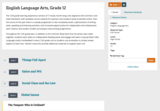
These explanations are linked to mythological allusions present in "The Rose of Versailles" manga. Source material is provided. RL.9-10.9 alllusions to other works.
- Subject:
- Arts
- English Language Arts
- Material Type:
- Reading
- Date Added:
- 12/01/2023

These explanations are linked to mythological allusions present in "The Rose of Versailles" manga. Source material is provided. RL.9-10.9 alllusions to other works.

Something seems familiar here: Students learn how allusion invites more into a text. Using "The House On Mango Street" students will learn about allusion by paralleling events from both the Bible and from Greek mythology.

Students will compare and contrast the written version of Pandora's Box with a video clip version. Video clip and worksheets are included.

In this video [1:42] join Iren, age 9, in the Greek and Roman galleries as she shares what she knows about ancient Greek gods and goddesses!
Khan Academy learning modules include a Community space where users can ask questions and seek help from community members. Educators should consult with their Technology administrators to determine the use of Khan Academy learning modules in their classroom. Please review materials from external sites before sharing with students.

Learn about Greek gods, heroes, and creatures through digital storytelling produced by students who have learned research techniques.

The 12th grade learning experience consists of 7 mostly month-long units aligned to the Common Core State Standards, with available course material for teachers and students easily accessible online. Over the course of the year there is a steady progression in text complexity levels, sophistication of writing tasks, speaking and listening activities, and increased opportunities for independent and collaborative work. Rubrics and student models accompany many writing assignments.Throughout the 12th grade year, in addition to the Common Read texts that the whole class reads together, students each select an Independent Reading book and engage with peers in group Book Talks. Language study is embedded in every 12th grade unit as students use annotation to closely review aspects of each text. Teacher resources provide additional materials to support each unit.

The laws that govern and the social norms that regulate society are not always fair, legal, moral, or ethical. What is a person to do about all this injustice? What are the hazards of righting injustices or changing social norms? And what are the dangers of doing nothing?
ACCOMPLISHMENTS
Students read and annotate Antigone, “Letter from a Birmingham Jail,” and Pygmalion.
Students write a literary analysis showing the effect of social class or the law on a character’s life.
GUIDING QUESTIONS
These questions are a guide to stimulate thinking, discussion, and writing on the themes and ideas in the unit. For complete and thoughtful answers and for meaningful discussions, students must use evidence based on careful reading of the texts.
How do social class and legal institutions shape literary characters’ lives (and presumably our lives)?
How does social class affect a person in dealing with the law (protect a person, hurt a person)?
How is social class determined in America and in other places in the world?
BENCHMARK ASSESSMENT: Cold Read
During this unit, on a day of your choosing, we recommend you administer a Cold Read to assess students’ reading comprehension. For this assessment, students read a text they have never seen before and then respond to multiple-choice and constructed-response questions. The assessment is not included in this course materials.

In this lesson, students continue to discuss Dr. King’s writing style. Then they will read and discuss W. H. Auden's “Law Like Love,” focusing on the comparisons to law in the poem.

Resource presents multiple digital formats of this literary work. Edward, Earl of Derby did this translation of Homer's epic.

Ancient Greek Mythology has worked its way into modern pop culture so deeply that it would be an almost Sisyphean task to compile every way it's manifested! [10:08]

Fun, illustrated trip through the story of Perseus from Greek mythology well suited for younger audiences. Each page summarizes part of the story along with a very eye-catching, animated illustration.

This supplement to a Social Studies unit on Ancient Greece asks students to examine the universal themes of mythology and create their own myths. Three lessons and three PDF format handouts are available.

Aimed at a younger student audience, enjoy this audio version of The Wooden Horse/Trojan Horse myth. Text to the story is included on the web site.

Illustrated encyclopedia entry on Achilles provides and overview of the history and representations of Achilles.

Reference page on Alcestis, mythical queen of Thessaly in Classical Greek mythology. Page includes links to further reading, timeline and illustrations.

Defines the Greek god Apollo and takes a look at his family, associated symbols, the Trojan War, and Greek art. Includes images, a timeline, and links to related content.

Illustrated encyclopedia entry defines and explores how the Greek god of war, Ares, was depicted in Greek mythology and Classical art.

Entry delves into the life of the Greek god of medicine, Asclepius, with a discussion on how he was portrayed in mythology and art.

Takes a look at the story of the Titan Atlas in Greek Mythology with a focus on his punishment from Zeus and his representation in Greek art.